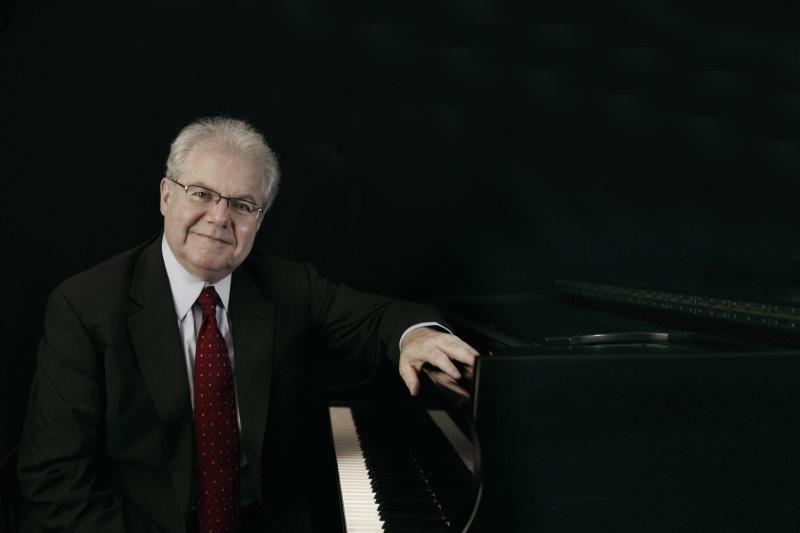Ax, Keenlyside, Dover Quartet, Wigmore Hall review – celebratory Schumann | reviews, news & interviews
Ax, Keenlyside, Dover Quartet, Wigmore Hall review – celebratory Schumann
Ax, Keenlyside, Dover Quartet, Wigmore Hall review – celebratory Schumann
The great pianist marks his 70th with a congenial if unassuming programme

Emanuel Ax here celebrated his 70th birthday with an all-Schumann recital. In fact, it was an all-Schumann marathon, a three-hour concert at Wigmore Hall featuring solo works, Dichterliebe with Simon Keenlyside, and, with the Dover Quartet, the Piano Quartet and the Piano Quintet.
The Arabeske, op. 18, began the concert, and demonstrated the pianist’s natural ease with the composer. Ax remains nimble and has an elegantly light touch. He revels in the brief snatches of melody that often blossom in the upper reaches of the piano, but he is just has happy intoning the smooth, rounded harmonies that form the basis of most of Schumann’s piano textures. Phrases were generously shaped, and cadences lingered, but there was never any sense that Ax was trying to make a point: These were personal and inward-looking accounts. The Fantasiestücke, op. 12, that opened the second part (of three) went further still. There was drama here, and plenty of colours and moods, but Ax seemed to be playing to himself, the results all the more singular and poignant for the pianist simply following his muse.
 Keenlyside’s Dichterliebe was a more torrid affair. The singer (pictured right, by Robert Workman) is never less than passionate, and delivered Heine’s pained texts with a rare intensity. His voice is maturing elegantly, losing some purity of tone, and evenness across the registers, but gaining character and burnish, ideal for Schumann’s lingering lines. Ax seemed reluctant to follow Keenlyside to his emotional extremes, choosing instead to contribute elegance and finesse to all those middle-register piano sonorities. But he couldn’t help be drawn in, following Keenlyside’s lead in gradually raising the emotional intensity. Even so, his most satisfying contribution was the work’s meditative coda, another reflective moment from which he could draw so much from the piano’s subdued textures.
Keenlyside’s Dichterliebe was a more torrid affair. The singer (pictured right, by Robert Workman) is never less than passionate, and delivered Heine’s pained texts with a rare intensity. His voice is maturing elegantly, losing some purity of tone, and evenness across the registers, but gaining character and burnish, ideal for Schumann’s lingering lines. Ax seemed reluctant to follow Keenlyside to his emotional extremes, choosing instead to contribute elegance and finesse to all those middle-register piano sonorities. But he couldn’t help be drawn in, following Keenlyside’s lead in gradually raising the emotional intensity. Even so, his most satisfying contribution was the work’s meditative coda, another reflective moment from which he could draw so much from the piano’s subdued textures.
The Dover Quartet is a young ensemble, but the players found as easy affinity with Ax’s autumnal Schumann. In the Piano Quartet, the pianist is integrated into the string ensemble, while in the Quintet it is more independent. But the interpretations of both works seemed to flow from Ax’s lyrical and energetic, but always unassuming, approach. The results were subdued, with only occasional dramatic outbursts, and even the Finale of the Quintet felt relaxed and unhurried. Ax rarely seemed to increase his dynamics to match the quartet, but the transparency of their textures always allowed him to shine through. For such an imposing work, this was a surprisingly lyrical and breezy account, highly lyrical, celebratory and, above all, fun. Happy birthday Emanuel Ax!
rating
Share this article
The future of Arts Journalism
You can stop theartsdesk.com closing!
We urgently need financing to survive. Our fundraising drive has thus far raised £49,000 but we need to reach £100,000 or we will be forced to close. Please contribute here: https://gofund.me/c3f6033d
And if you can forward this information to anyone who might assist, we’d be grateful.

Subscribe to theartsdesk.com
Thank you for continuing to read our work on theartsdesk.com. For unlimited access to every article in its entirety, including our archive of more than 15,000 pieces, we're asking for £5 per month or £40 per year. We feel it's a very good deal, and hope you do too.
To take a subscription now simply click here.
And if you're looking for that extra gift for a friend or family member, why not treat them to a theartsdesk.com gift subscription?
more Classical music
 BBC Proms: First Night, Batiashvili, BBCSO, Oramo review - glorious Vaughan Williams
Spirited festival opener is crowned with little-heard choral epic
BBC Proms: First Night, Batiashvili, BBCSO, Oramo review - glorious Vaughan Williams
Spirited festival opener is crowned with little-heard choral epic
 Interview: Quinteto Astor Piazzolla on playing in London and why Mick Jagger's a fan
Music Director Julián Vat and pianist Matias Feigin compare notes on Piazzolla
Interview: Quinteto Astor Piazzolla on playing in London and why Mick Jagger's a fan
Music Director Julián Vat and pianist Matias Feigin compare notes on Piazzolla
 Classical CDs: Bells, birdsong and braggadocio
British contemporary music, percussive piano concertos and a talented baritone sings Mozart
Classical CDs: Bells, birdsong and braggadocio
British contemporary music, percussive piano concertos and a talented baritone sings Mozart
 Siglo de Oro, Wigmore Hall review - electronic Lamentations and Trojan tragedy
Committed and intense performance of a newly-commissioned oratorio
Siglo de Oro, Wigmore Hall review - electronic Lamentations and Trojan tragedy
Committed and intense performance of a newly-commissioned oratorio
 Alfred Brendel 1931-2025 - a personal tribute
A master of feeling and intellect
Alfred Brendel 1931-2025 - a personal tribute
A master of feeling and intellect
 Aldeburgh Festival, Weekend 2 review - nine premieres, three young ensembles - and Allan Clayton
A solstice sunrise swim crowned the best of times at this phoenix of a festival
Aldeburgh Festival, Weekend 2 review - nine premieres, three young ensembles - and Allan Clayton
A solstice sunrise swim crowned the best of times at this phoenix of a festival
 RNCM International Diploma Artists, BBC Philharmonic, MediaCity, Salford review - spotting stars of tomorrow
Cream of the graduate crop from Manchester's Music College show what they can do
RNCM International Diploma Artists, BBC Philharmonic, MediaCity, Salford review - spotting stars of tomorrow
Cream of the graduate crop from Manchester's Music College show what they can do
 Classical CDs: Bells, whistles and bowing techniques
A great pianist's early recordings boxed up, plus classical string quartets, French piano trios and a big American symphony
Classical CDs: Bells, whistles and bowing techniques
A great pianist's early recordings boxed up, plus classical string quartets, French piano trios and a big American symphony
 Monteverdi Choir, English Baroque Soloists, Suzuki, St Martin-in-the-Fields review - the perfect temperature for Bach
A dream cantata date for Japanese maestro and local supergroup
Monteverdi Choir, English Baroque Soloists, Suzuki, St Martin-in-the-Fields review - the perfect temperature for Bach
A dream cantata date for Japanese maestro and local supergroup
